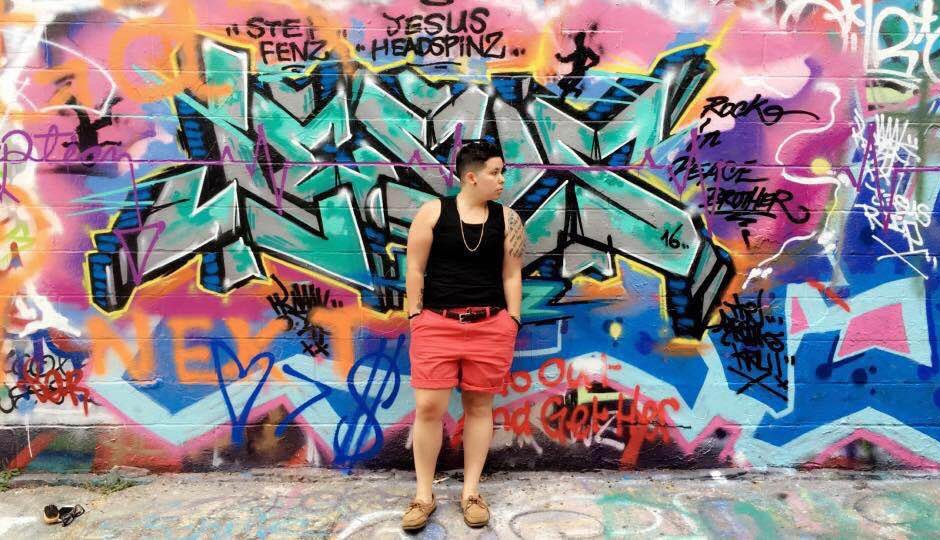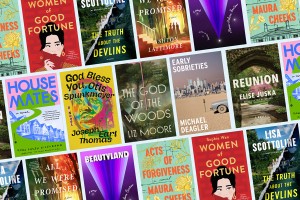LGBTQ&A: Nikki Lopez

Nikki Lopez. Photograph by Amy Perez
Nikki Lopez is a Latinx queer activist who was recently been appointed the new executive director of GALAEI — A Queer Latin@ Social Justice Organization. We recently chatted with the community leader about her new goals and plans for GALAEI and her perspective on the current discourse surrounding racism in the Gayborhood.
Tell us a little about yourself.
Well, I was born in Rio Piedras, Puerto Rico, and moved to Daytona Beach, Florida, as a baby. My mother was a single mom who raised three kids all by herself, in a small town called Holly Hilly. She arrived not knowing any English, and for the most part was alone. I learned a lot about perseverance and resilience from her.
Florida at that time was (and I would venture to say still is) gripped with the vestiges of a Jim Crow South. I have distinct memories of dealing with extremely racist white folks who would drive in their pickup trucks up and down our block, waving Confederate flags and swinging Molotovs in our yard while yelling “Go back to Mexico!”, and of dealing with the subtle racial ignorance of asking where in Mexico Puerto Rico was located. We were poor, brown, trying to survive. We found our sanctuary in the Pentecostal Church, and I like to think that’s where I learned my fundamental ideas around community, social services, and collective action. That’s also where my love grew for gospel music.
Usually I was in my room with my nose in a book, or playing video games with my brothers or catching up on the latest comic book series (Batman is my favorite). I was an eclectic weird kid, and my adult self is proud of her. My childhood was a life of in-betweens — between hip-hop and salsa music, Tupac and Big Pun, Southern-cooked meals like collard greens and corn bread and Boricua delicacies of rice and beans. My childhood was formative to my understanding of living a full intersectional life.
I came to the Philadelphia area in 2006 to attend Bryn Mawr College, and I fell in love with this city. It embodied the same grit, resilience, eclectic Boricuaness that I embodied; it was truly a queer city, for a queer Latinx. Even though I spent a couple of years at Rutgers Newark, I knew I needed to come back. Philly became home.
You’ve just been appointed as the new executive director of GALAEI. What new ideas and plans do you envision for the organization?
With the help of the collective queer Latinx community of Philly, I want to curate GALAEI into a community center for queer Latinx people. Often our lives are seen only in relation to our survival from tragedy and trauma, and while those may be part of our narratives, it is only a piece of the mosaic to our complex lives. I envision a center in which the queer Latinx community can come and address the needs of their holistic health and garner the skills, tools, and resources to empower themselves as individuals and as a whole people. This includes expanding the programs for queer Latinx youth, continued proactive sex-positive HIV/AIDS prevention programs that are spearheaded and centered around queer Latinx folks, being proactive in organizing and collaborating with fellow organizations that are working for undocumented-immigrant rights, addressing the epidemic of violence against black and Latina trans femmes and gender-nonconforming individuals, and making sure trans and gender-nonconforming black and Latinx folks are in positions of power to curate their liberation.
I see GALAEI’s future flourishing in our identity as a social justice organization through these various channels that address our multilayered, intersectional lives. All of our efforts and programs will be framed in an intentional pro-black and -racial justice lens, which will demand constant reflection, self-accountability and work. That is the only way to systemically change and dismantle the institutional racist practices that have continued white supremacy. GALAEI’s inception occurred through the revolutionary and creatively artistic practices and organizing efforts of David Acosta and the queer Latinx and black folks impacted by HIV/AIDS in 1989 — I believe that commanding magic and energy has continued over the 27 years GALAEI has been in existence. I see a center for the queer Latinx community that enriches our cultural, artistic, holistic health, and empowers us to continue to thrive. Such a place will take time to build, but I know the seeds are already being planted.
What is the current state of Philly’s Latinx LGBTQ community in terms of access and equity in the Gayborhood?
First we have to pick apart our ideas of access and equity in the Gayborhood. What does the “gayborhood” mean for Latinx people? What does access look like? What does equity look like? Whose gayborhood are we speaking of? I say this because there is a rich history of community made gaybor“hoods” by multiple groups of queer Latinx people — they just aren’t located in Center City.
How often have those Center City folks ventured into the spots formed by queer Latinx folks in West Philly, like a party produced by DJ Precolumbian or Dame Luz? Marched in solidarity with the queer Latinxs organizing to dismantle Berks Detention Center? In North Philly, have folks ventured into Sammy’s Place or a Travesura Night, attended a Thursday LGTBQ night at Tierra Colombiana when it was produced? Go to a drag performance hosted by Lady Labelle, or attended an old school night DJ’ed by Cookie Quiñones?
And of course these are only a few of a plethora of ways in which I have personally witnessed the queer Latinx community continue to thrive. Queer Latinx people have constantly demonstrated that what is being sought is not access to equality or equity. Equality is not enough, because it does not mention the systemic barriers that causes the inequality; equity is not enough, because it means despite different supports it only makes the barrier comfortable to “deal with” — rather, liberation removes the systemic barrier. Queer Latinx people have been constantly fighting for liberation. As GALAEI’s next executive director, I will continue that fight for liberation.
I recently wrote a commentary piece asking the Office of LGBT Affairs to take a more public and proactive stance against racial insensitivity in the Gayborhood. Do you think there are ways the office could better address the issue?
I think the first step in talking about the racial issues that plague Philly’s Gayborhood is first naming it as so: racism. I take issue with the phrase “racial insensitivities,” because many of the experiences that black, brown, and Latinx folks feel in the Gayborhood aren’t from “insensitive” acts — they are deliberate prejudices that cause trauma unto people of color. It’s violent and it’s an attack. They are attacks on our identity, our culture, our personhood, our humanness. I can personally attest to watching groups of black and brown patrons being profiled and targeted by security at some of the top gay clubs of cities. As a DJ, I was specifically told by certain bar managers not to play specific genres of music (hip-hop, rap, and Reggaeton) as to not attract “that” crowd. I have watched as white drag performers refuse to recognize racial privileges and remain silent when black and brown folks are being attacked on social media, with some going so as far as being the attackers. By naming it something other than racial insensitivities is a first step of confrontation and accountability as a “Gayborhood.”
Institutionally, how do you find LGBTQ racism addressed by local government overall?
My question would be: Are white politicians, government officials, and employees being proactive in talking about white privilege and race amongst themselves? Are they holding themselves accountable in their complicit tolerance of white supremacy? The historical response to addressing “racial insensitivities” of the Gayborhood is to produce a town hall. When they occur, the white folks that should be in a room aren’t there. People of color are typically left out of the coordination of said events, and it then turns into, once again, black and brown communities exhausting their time and energy and mental health. And while, yes, there have been a few concerted efforts from the mayor’s office to address these issues (like a recent survey conducted, and a creation of an app that allows folks to live document racist acts), the efforts must not go in vain, must not be one-shot, but continual.
What can the Gayborhood and Philly at large do to continue to include and cultivate the Latinx LGBTQ community?
It’s simple. Understand that the queer Latinx community will take the reins. Hear their voices. Come as an ally to listen and not take up space. Confront one’s own self, hold oneself accountable, to then hold your community accountable. Do the work. Do the hard necessary work. Live intentional multilayered lives. Get out of the Gayborhood every once and a while. Live the lives that queer black and brown folks have constantly had to learn how to live in order to thrive and survive this life.


